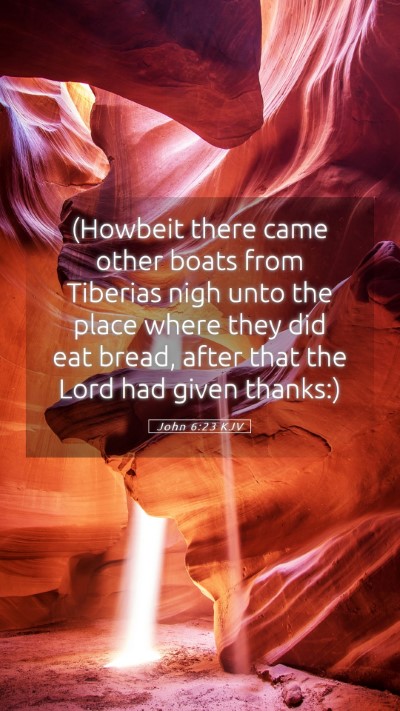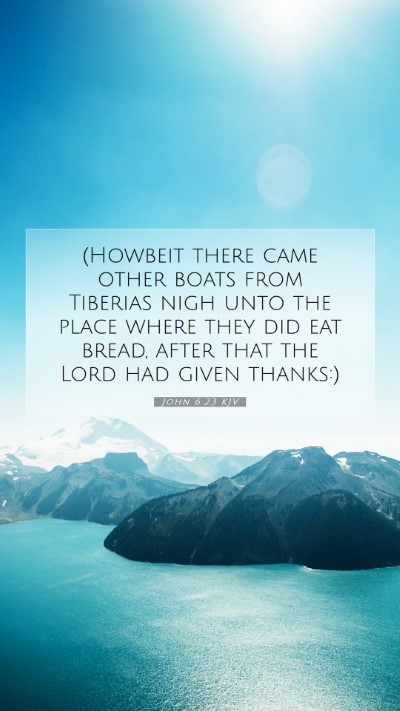Bible Verse Meanings and Interpretations
When analyzing this verse, we delve into how it illustrates the miraculous provision of Jesus—the bread of life and the sustenance He offers to all believers.
- Contextual Background: The context of this passage follows the miraculous feeding of the 5,000. This event underlies the importance of Jesus as the divine provider.
- Symbolic Significance: The boats arriving from Tiberias signify the ongoing search for spiritual nourishment and the desire of the crowd to follow Jesus for more than just physical sustenance.
- Application to Daily Life: This scripture invites believers to recognize the deeper spiritual truths behind Jesus' miracles and to seek Him not only for physical needs but for spiritual fulfillment.
Biblical Exegesis of John 6:23
In applying exegesis to this verse, we understand that the arrival of the boats signifies the reaction of the crowd to Jesus' actions. It reflects on the human tendency to pursue miracles rather than the miracle worker Himself.
- Matthew Henry: Comments on the nature of the crowd’s interest in Jesus, emphasizing that while they sought His miracles, they often missed the deeper lessons He provided.
- Albert Barnes: Highlights the importance of thanksgiving in Jesus' acts and how it serves as a model for believers in their own prayers and acknowledgments to God.
- Adam Clarke: Focuses on illustrating the geographical significance of Tiberias and how this plays into the narrative of Jesus’ ministry, presenting Him as one who transcends physical boundaries to meet spiritual needs.
Bible Study Insights
This verse serves as a powerful cornerstone for group discussions in Bible study settings. Here are some key insights that can lead to richer conversations:
- Historical Context: Explore the significance of the Sea of Galilee and the region of Tiberias during Jesus’ time.
- Application of Jesus’ Teachings: Discuss how the passage applies to contemporary Christian life. Are we seeking Jesus for the right reasons?
- Connecting with Other Scriptures: Link this passage to Jesus’ declaration as the Bread of Life in prior verses (John 6:35) and reflections in the Old Testament regarding God’s provision.
Cross References
To deepen the understanding of John 6:23, consider these related scriptures:
- John 6:35: "And Jesus said unto them, I am the bread of life: he that cometh to me shall never hunger; and he that believeth on me shall never thirst."
- Matthew 14:20: "And they did all eat, and were filled: and they took up of the fragments that remained twelve baskets full."
- Exodus 16:4: "Then said the LORD unto Moses, Behold, I will rain bread from heaven for you; and the people shall go out and gather a certain rate every day..."
Meaning of Bible Verses
John 6:23 serves as a testament to Jesus' role as the spiritual bread that believers need. In deeper biblical study, it becomes clear that the pursuit of Jesus should be motivated by the desire for spiritual truth and relationship rather than solely for temporary gains.
Conclusion
Ultimately, understanding John 6:23 involves a various interpretations that together enrich a believer's knowledge of God's continuous provision. This passage invites us to reflect on our motivations for seeking Jesus and encourages a deeper intimacy with Him beyond mere physical desires.


